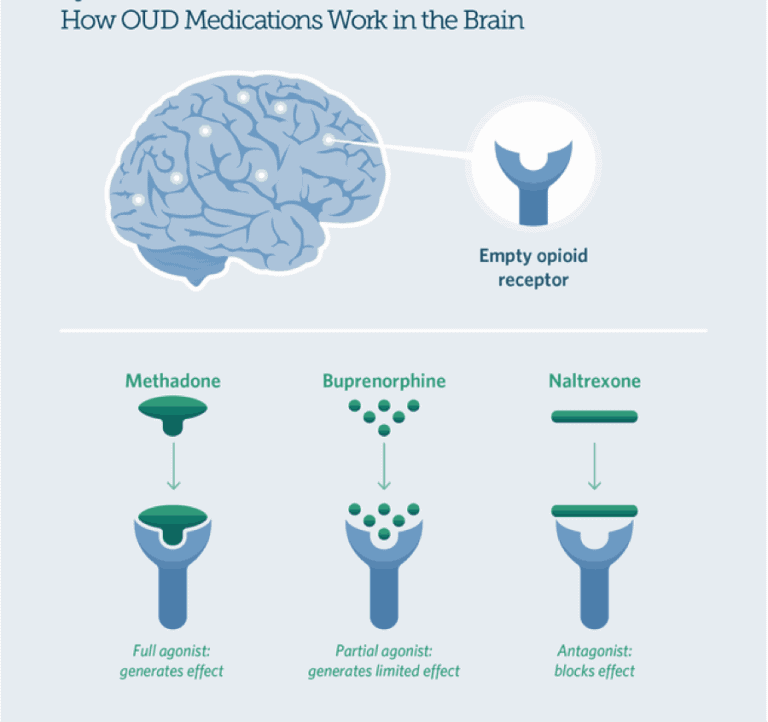MAT: Medication Assisted Treatment
Medication Assisted Treatment (MAT) is a Miraculous Development
Because withdrawal is often painful, medication can be used to help you manage cravings. Some medications can also help you manage cravings for opioids. By using these treatments in tandem, we can help you find lasting relief.
Medication is an effective treatment for heroin addiction. These medications can:
- Decrease opioid and alcohol use
- Decrease opioid and alcohol overdose deaths
- Increase treatment retention
- Increase social functioning
Your options for opioid withdrawal medication may include Buprenorphine, Suboxone, Subutex, Sublocade, Vivitrol, or Lofexidine.
All of these medications work best when they’re used as part of a complete assisted rehab program.
What is the Behavioral Component of our Medication Assisted Treatment (MAT) Program?
Our MAT counseling is comprehensive and evidence based. We help you build a treatment program that includes therapy, counseling, 12-Step support groups, and other treatment.
Who Needs the Medication-Assisted Treatment (MAT) Program?
You might need medication-assisted treatment for heroin if you’re addicted or dependent on the drug. Anyone with opioid use disorder (OUD) should attend our heroin addiction center for outpatient treatment.
Signs of Opioid Withdrawal
If you experience heroin withdrawal when you try to stop using, then you may benefit from MAT. It can be hard to stay motivated without these medications which help reduce withdrawal symptoms, such as
- Obsession/Cravings
- Dysphoria, or a general sense of feeling bad
- Diarrhea
- Depression
- Irritability
- Muscle Pain
- Nausea
- Restlessness
- Runny Nose
- Sweating
- Yawning
Signs of Opioid Addiction
To get loved ones the drug rehab services they need, it’s important for family members and friends to know the signs of opioid addiction. Knowing these signs can help get an individual the opioid addiction treatment they need to prevent disastrous consequences.
- Common signs include the following:
- Inability to stop the use of the drug
- Periods of anxiety or depression
- Failing to meet responsibilities
- Reckless behavior
- Slurring of speech
- Changes in sleep and eating habits
When someone begins showing signs of addiction, time is of the essence to find them help. Contact a facility that offers opioid addiction treatment to start the process for those who need it.
Confidential Recovery's San Diego Rehab for Opioid Addiction
Our specialized opiate addiction treatment program includes opioid- specific group therapy, educational sessions and individual therapy. Our comprehensive approach also keeps you engaged in rehab activities over a longer period of time than most addiction treatment programs, and includes family involvement, recovery support groups and accountability as integral parts of our intensive outpatient and outpatient drug rehabilitation programs. We know from experience that this combination of enhanced opioid rehab services, medication-assisted treatment, clinical interventions and active engagement over a longer period of time offers the best chance for long-term recovery.
In order to plan the most effective substance use disorder treatment for each patient, our clinicians consider many factors, such as:
- How long you’ve been using opioids, heroin or other opiate drugs
- The amount and frequency of your substance use
- Whether you use alcohol other drugs in addition to opioids
These are just a few of the considerations that provide us with important information about your specific situation. In planning a rehab program tailored to meet your individual needs, we will also take into account your medical condition and any other physical or mental health issues you are experiencing
What is MAT?
Medication-assisted treatment (MAT), combines behavioral therapy and medication to treat addiction, including alcoholism. MAT treatments are becoming increasingly popular in addiction treatment (and in some cases required/diversion programs). This shift in the addiction field is happening as a result of the scientific addiction literature detailing the overwhelmingly positive outcome data. In short, statistically, patients who utilize MAT have far better outcomes. They not only stay sober more consistently and for longer periods than standard behavioral “treatment as usual” participants, they also score higher in sequelae of associated recovery behaviors such as treatment attendance, reduced risk taking behavior, more pro-social behavior, less criminal activity and show less depression and anxiety than those not receiving MAT.
BEHAVIORAL TREATMENT + MEDICATION = MEDICATION ASSISTED TREATMENT
What Addictions Does MAT Treat?
Alcoholism:
The anti-craving medication Naltrexone is FDA approved for the treatment of alcoholism. Naltrexone is a pill taken daily and has helped decrease cravings in people recovering from alcohol use disorders. Naltrexone and the long acting form of Naltrexone, Vivitrol (given via shot 1x month) are effective anti-craving medications and increase the patient’s ability to maintain sobriety and improve treatment outcomes. Additionally, the Vivitrol form of this medication is often even more effective than the daily pill form of Naltrexone, as it greatly reduces compliance issues.
Opioid Addiction:
There are 3 FDA opioid medication assisted therapies:
Suboxone (a partial agonist)
Confidential Recovery provides Suboxone detox tapers or Suboxone maintenance treatment. Additionally, there has been some evidence that Suboxone has been especially useful for people recovering from addiction who also have long term and frequent nervous system deregulations, better known as chronic PTSD. Suboxone increases the patient’s attendance in treatment, which is notably worse for people dually diagnosed with PTSD and substance use. Other brand names for buprenorphine include Sublocade, and Subutex.
Methadone (a full agonist)
Not available at Confidential Recovery.
Naltrexone (blocker)
Confidential Recovery does provide monthly prescription for active clients. The anti-craving medication Naltrexone is FDA approved for the treatment of opioid addiction. It is a pill taken daily and has helped decrease cravings in people recovering from opioid use disorders. Naltrexone and the long acting form of Naltrexone, Vivitrol (given via shot 1x month) are effective anti-craving medications and increase the patient’s ability to maintain sobriety and improve treatment outcomes. Additionally, the Vivitrol form of this medication is often even more effective than the daily pill form of Naltrexone, as it greatly reduces compliance issues.
How Do These Medications Affect the Brain?
Opiate “Full Agonists”
Includes drugs like Fentanyl, Oxy, Heroin, and Vicodin binds to the receptor and produces strong euphoric effects (e.g. Oxy, Fentanyl, Vicodin, Heroin, Methadone).
Opiate “Partial Agonist s”
Includes drugs like Buprenorphine and Suboxone. Binds to the Mu receptor – can be euphoric, but can only take the elevator up so high. Weaker euphoric effects (e.g. Buprenorphine, Suboxone).
Opiate “Antagonists”
Binds to the receptor with no opioid effects, blocker (e.g. naloxone, naltrexone)
Who Should Consider MAT?
- People with an alcohol use disorder
- People with an opioid use disorder
- People with treatment resistant alcohol or opioid use disorders (often MAT is the game changer)
- People who have used opioids for over one year
- People who want to stop taking opiates but are afraid of the withdrawal symptoms



